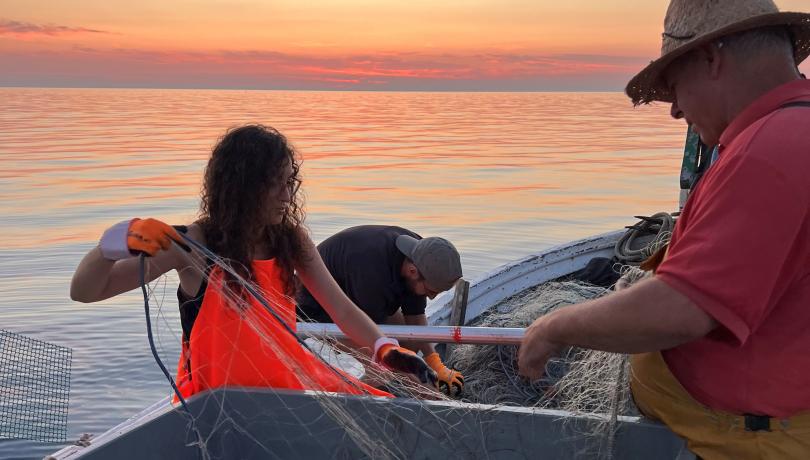In total, over the last five years, more than 4,000 gorgonians have been returned to the sea with a survival rate of 90% and various modifications of fishing gear have been successfully tested.

This summer, the mitigation (MITICAP) and restoration (RESCAP) projects of the Institut de Ciències del Mar (ICM-CSIC) in the Cap de Creus (Girona) have returned to the sea more than 1,200 gorgonians that had become entangled in fishing nets and have successfully modified the artisanal fishing gear in the area, thus reducing the impact on benthic communities.
Over the five years that these two projects have lasted, ICM-CSIC researchers have transplanted, in an area of almost two hectares, more than 4,000 gorgonians between 30 and 90 meters deep in the Natural Park of the Cap de Creus and the Site of Community Importance (SCI) of the canyons of the Gulf of Lions and the Natura 2000 Network. Also, during this last year, restoration and mitigation actions have been carried out in the Freus d'Eivissa i Formentera marine reserve.
As has been verified with underwater robots, the survival rate of transplanted gorgonians exceeds 90%, and their reproduction rate is very similar to those that have never left the natural environment, which demonstrates the rapid adaptation of the colonies once transplanted.
The fishermen’s role
In addition to the return of the gorgonians to the sea, during these five years the scientific teams have participated in more than 200 workshops with fishermen in which several modifications of their fishing gear have been tested. The most successful of these has been the enlargement of the mesh size of the artisanal trammel nets used to catch lobster. Its effectiveness has been successfully tested with fishermen from Formentera, el Port de la Selva and Cadaqués.
On the other hand, as in previous years, several workshops of lost fishing gear recovery have been carried out in collaboration with volunteers and fishermen involved in the MITICAP project. These actions seek to reduce ghost fishing, i.e. abandoned fishing gear, and to raise awareness among both the fishing sector and society of the need to conserve the marine environment. Thanks to these meetings, this year it has been possible to recover 21 lost pots, 1 trammel net and 1 longline, as well as 700 kg of marine garbage.
"With this year's, more than 4,000 gorgonians have been successfully returned to the sea thanks to the close relationship with the artisanal fishermen of the fishermen's associations of Port de la Selva, Cadaqués and Formentera", celebrates Stefano Ambroso, head of the RESCAP project, who adds that "over the years, the involvement of fishermen has been greater and we have observed an improvement and adaptation of the methodologies with the accumulated experience".
For her part, the technical manager of the MITICAP project, Patricia Baena, points out that "Throughout these five years, a valuable synergy and a relationship of trust has been established between two groups with traditionally opposing views: scientists and fishermen. Baena is confident that this trust will now serve to work together to ensure the long-term maintenance and sustainability of these ecosystems.
The importance of awareness
Both MITICAP and RESCAP are developed in collaboration with the Biodiversity Foundation of the Ministry for Ecological Transition and the Demographic Challenge, through the Pleamar Program, co-financed by the FEMP, and are concerned with raising awareness among citizens regarding the conservation of marine ecosystems and sustainable fishing. For this reason, during these years several theoretical and practical workshops have been held, as well as talks for all audiences, in which more than 1,000 people have participated.
We have also worked to raise awareness in the fishing sector, to whom we have conveyed the idea that there is another way of fishing, just as effective, but less invasive. Thanks to this, a change of attitude has been observed in the majority of fishermen, which reinforces the need to continue to support collaborative projects between the fishing sector and research centres to effectively transmit messages and learning that will result in greater interest and commitment to marine conservation among fishermen.
Now, both projects have come to an end, but the objective of the ICM-CSIC is to give them continuity in Cap de Creus and Formentera, as well as to export the model to other regions. Marine mitigation and restoration measures are key in the current scenario, since, according to experts, achieving zero impact from fishing activity is almost impossible.